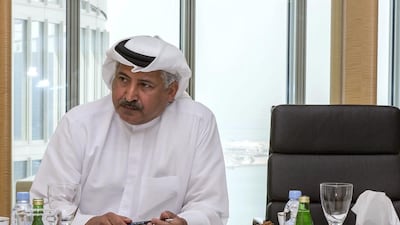History is littered with nations that have squandered their wealth but Khalifa Mohamed AlKindi says a few prudent decisions helped Abu Dhabi from the beginning to preserve its oil wealth for future generations.
Mr AlKindi, the Chairman of the UAE’s Central Bank, credits the Abu Dhabi Investment Authority (Adia), one of the world’s largest sovereign wealth funds, with being an incubator whose professionalism set the tone for all of Abu Dhabi’s other financial institutions.
“Adia has preserved Abu Dhabi’s capital, grown its capital and has generated a very good rate of return,” says Mr AlKindi, who began his career at Adia in 1983 and worked his way up through the ranks to serve as its Deputy Managing Director before a stint at the Abu Dhabi Investment Council as its managing director that ended last year. Since 2012, Mr AlKindi has also been the Chairman of the Central Bank.
“If you look at the last 30 year, 40 years, they have achieved, 7 to 8 per cent returns. It was unique at the time after oil prices went through the roof.
“And don’t ignore the human talent that Adia provided to the system,” he says.
The investment authority got a shot in the arm in the 1970s after a series of oil shocks that sent the price of crude rocketing, quadrupling in a the space of six months in 1973.
Mr Alkindi says that while the windfall was welcome, Abu Dhabi had started saving for a rainy day well before the oil crises of the 1970s due the foresight of the late Sheikh Zayed, Founding Father of the UAE, who had a personal reputation for being frugal and penny wise.
Like many of his educated peers at the time, Mr AlKindi says he was presented with essentially two or three options after studying abroad, although for the ambitious it essentially boiled down to either joining Adia or the Abu Dhabi National Oil Company, the country’s main oil producer.
After graduating in economics from Eastern Michigan University, he threw himself into Adia with gusto, taking part in a range of investment mandates, including bonds, stocks, commodities and property. He also served on ADIA’s Investment and Strategy Committees. Except for a sabbatical at Adnoc, Mr Alkindi remained at Adia for nearly 25 years before being tasked in 2007 with setting up the Abu Dhabi Investment Council (Adic), a sister fund to Adia.
Adic was created in 2007 to supplement the Emirates’s other global investments, although unlike Adia, its investment universe includes the United Arab Emirates, and the fund has stakes in most of Abu Dhabi’s biggest banks including the National Bank of Abu Dhabi and Abu Dhabi Commercial Bank.
Adic’s first 34 employees, Mr AlKindi says, were all taken from Adia, because there was no richer source of financially skilled employees to tap.
The skills, he says, that he learned at Adia were invaluable in making sure that Adic achieved similar returns and preserved capital.
“I always call Adia the best school, better than a university or a degree,” says Mr AlKindi.
“This is the best practical school of anyone’s careers, one that teaches you organisation, diversification, how to deal with people, how to deal with investments.”
mkassem@thenational.ae
Follow The National's Business section on Twitter

